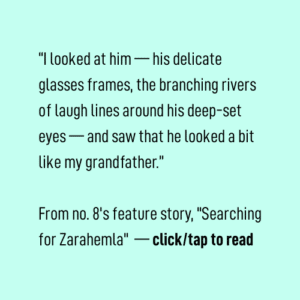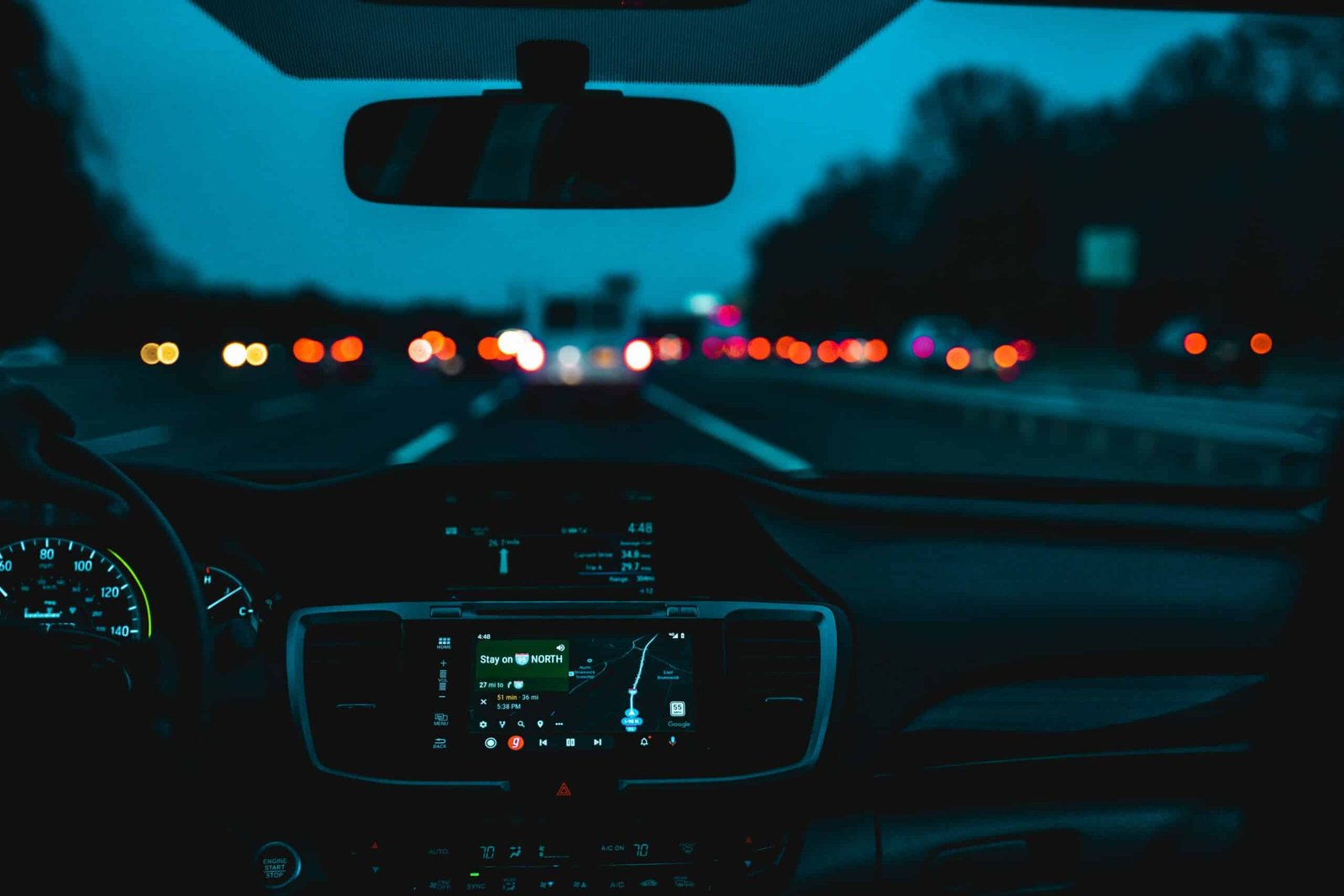Sara Benincasa
The Humanitarian Humorist
no. 8, Autumn 2022
Not everyone can find humanity and humor in any situation. Sara can. She’ll be with us in every issue, guiding us toward both. In this issue, the path starts with two words: “road trip.”
My brother once caught my grandmother and grandfather on a clandestine road trip. He was a nurse at the time, managing a group home for adults with developmental disabilities. One of his clients needed a prescription refill, so he drove to the pharmacy in the little town where our parents grew up and our grandparents still lived. Only Grandmom was supposed to use the car. But when my brother saw their immaculately clean, sensible sedan pull into the pharmacy parking lot that day, Grandmom wasn’t behind the wheel. Pop-Pop was.
My brother didn’t approach them, nor make himself known. We have to let the people we love keep their secrets sometimes.
My brother didn’t say anything about it to anyone until my grandfather passed away. He said he owed it to Grandmom and Pop-Pop for not busting him when he threw a rager at my parents’ house when he was in high school and our folks were out of town. I was in college up in Boston or down in Asheville; it was one or the other, unless it was one of the other towns home to the other schools I tried. Grandmom, the former head of HR at a trucking company, and Pop-Pop, a former woodshop teacher-turned-principal, called the house to check on my brother and some other drunk teen answered, giggling over the loud music in the background. “I think we’d better go over there,” my grandmother said to my grandfather. She and my grandfather drove the 45 minutes to their youngest son’s house, found his youngest son in the midst of a big fiesta, and told him it was time for everybody to go home. They didn’t yell. They didn’t have to.
Everybody went home. Our grandparents didn’t tell on him to our parents.
Many years later, he paid them back by not telling on them to our parents. I’m sure it helped that Pop-Pop drove so slowly and carefully, with his characteristic conscientious nature. His license hadn’t been taken away and he’d never gotten into an accident; we had all just felt, and he agreed, that he should stop driving. His cognition was slowing, and there was always somebody to give him a ride to the county golf course, or to the Rotary Club, or to the polls (where he’d vote for the Democrats, every time). But even if our grandfather had screeched into the lot after speeding through some stop signs, I think my brother would’ve merely sat him down for a kind chat about responsible choices.
I miss my grandparents. I still think about them a lot. I don’t live so far from where they built their own three-bedroom house (a room for two girls, a room for two boys, and a room for themselves) in the early ‘60s. The house was sold years ago, but I still visit it now and again to say hi from a polite distance. Like my grandparents, I don’t want to bother anybody. And though I’m only in my forties, I move slower now, too.
* * *
One of my favorite road trip routes is one I take frequently after visits to see my two small nephews. It takes me from Central Jersey, through my brother’s town and the town where our parents grew up and the town where some of our people first settled when they came over from Ireland; to North Jersey; across Staten Island; into Brooklyn, where some of our other people first settled when they came over from Sicily; and then to my little home in Manhattan. It’s a 48-mile drive that takes anywhere from 50 minutes to three hours depending on the time of day, the weather, and other New York City traffic variables.
Sometimes, when it’s 2 a.m. on a Saturday and I’m headed back from a late night of watching absurd reality shows with my brother and sister-in-law on the couch after their kids go to sleep, or when it’s midday on a Tuesday and summer storms have kicked up and people are pulled over under highway overpasses to wait out the rain — when I know the trip back to Brooklyn is either going to be super quick or interminably long — I’ll make a little detour to drive past our grandparents’ old house, to pay my respects to the memory of how our family used to be.
I slow down, and I look at the little house with the white siding and the lamppost out front. I’m not sure if the new people replaced the old slate pavers on the front walkway; I assume so. I remember the way that house smelled, and how cool it was in summer, how cozy in winter. There were so many clocks in different rooms, including a cuckoo clock, and my grandfather loved when they all chimed at the same time. My grandmother did not, but she put up with it.

It was a gorgeous example of homespun mid-century modern design. The living room had an improbable cathedral ceiling. My grandfather had big dreams. He wanted to write a book. He never finished it, and always told me how happy he was that I became an author. One of my books is dedicated to him and to my grandmother. I have read the (thankfully chaste) diary he kept when they were dating. He was besotted with her.
The bedroom doors had slats, making them ill-suited for privacy. You couldn’t see through them, but you could certainly hear things if people didn’t whisper. I would have hated growing up there as a daughter, but I loved visiting as a granddaughter.
There was a broken area in the leaded glass beside the front door. I guess my grandmother threw something at it once when she was drinking. My father told me when I was around 20 that he looked at that spot every time he went over, for years and years. It got fixed at some point; I don’t remember when it stopped being broken, but I know it did.
I don’t hang around long on that street. It’s a small town, the kind of place where you’d notice a random car idling while a strange woman stares out the window. Like I said, I don’t want to bother anybody.
I drive home, to my home, the one I picked out, where I pay the monthly bills and, soon, the fee to repair the dishwasher. When you own a place and something cracks, you have to find a way to fix it. Otherwise, you simply learn to live with the way it is now. I park on the street. When I leave the car parked for too long, I get a ticket, or — in the cooler weather — mice build a nest in the engine.
It’s dangerous, to let things sit, though. The dishwasher has been broken for so many months that I forget all about it sometimes. The mold could set in. Sooner or later we must make things whole again.
Sometimes I live too much in my head. I forget to do the things I need to do. The little trips make me think differently. They keep me moving. They keep the vermin from settling in and making a home. They’re adorable, but they’ll eat through the wires.
I can rest. I can take breaks. I can pull over to the side of the road and reflect. But I have to keep things in shape. I have to attend to what needs fixing. I can go slow sometimes, but I have to keep going, until I stop for good.
Sara Benincasa is a comedian, actress, college and corporate speaker on mental health awareness, and the author of the books Real Artists Have Day Jobs, DC Trip, Great, and Agorafabulous!: Dispatches From My Bedroom. She hosts the podcast “Well, This Isn’t Normal,” which blends interviews with relaxation techniques, and wrote for the 13th season of Mystery Science Theater 3000. She’s also a columnist here at Pipe Wrench.
Portrait by Libby Greenfield.

More great reading
from Pipe Wrench no. 8
Searching for Zarahemla
Journalist Emily Fox Kaplan recounts an epic Mormon road trip across Mesoamerica. How many ways are there to tell a story? And how do we know what’s true?
Guilt Trip
Columnist Soraya Roberts wonders if the best trip is no trip at all. How can we still justify air travel in the age of unchecked climate change?
Never Say Never
Scholar Brittany Romanello tries to answer the question: Am I still Mormon? A personal essay on embracing faith and ambiguity.


